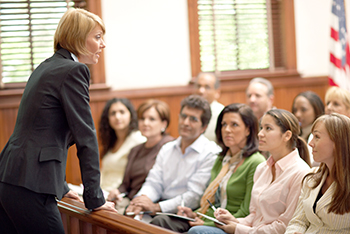Here’s What You May Have Missed
This month we highlight readers’ comments posted online to two WisBar InsideTrack articles. Let’s hear what you have to say. Post comments to articles online or respond to Facebook, LinkedIn, and Twitter posts. Or simply email the editors at wislawmag@wisbar.org.
The D isappearing Jury Trial: Implications for the Justice System and Lawyers
isappearing Jury Trial: Implications for the Justice System and Lawyers
For the past 30 years, jury trials have steadily declined in both federal and state courts, including in Wisconsin. To answer the questions, “why is this happening, and how does it impact lawyers and the justice system,” legal writer Joe Forward invited the perspectives of two trial attorneys and presented data from circuit court statistics to show trends in civil and criminal cases in Wisconsin from 2003-2012. (WisBar InsideTrack, March 19, 2014.)
Several factors have led to a general decline in civil jury trials over the years, including high costs, increased use of mediation, tort reform, advertising, political developments, and changing perceptions that juries are not as receptive to plaintiffs, and more. Fewer jury trials can lead to unwanted consequences, too, including less trial experience for younger lawyers.
Asked how the disappearing jury trial as a deepening trend affects you as a lawyer or the legal system, readers weighed in by posting the following comments.
william.gabler@wicourts.gov
Excellent, well researched and well written article. For all the reasons mentioned in the article, I agree; the demise of jury trials (both civil and criminal) adversely affects the justice system’s ability to protect individual rights and hampers development of the common law.
chrisdyer@centurytel.net
I have heard from older attorneys that they used to be able to simply subpoena treating physicians to give testimony at depos or trial. There is far less access to caregivers and far higher costs for the same in recent years. A letter to a physician is now responded to by a letter from the legal department that a meeting can be arranged after an estimated fee is posted up front, at the tune of $300 or more. It seems that Burnett. v. Alt, 224 Wis. 2d 72, 589 N.W.2d 21 (1999), has definitely changed the landscape in terms of the number of personal injury cases going to trial.
dlasker@co.juneau.wi.us
Respectfully, I think this article misses any reference to what is probably the biggest single reason there are fewer jury trials today than 30 years ago: the change in the application of the standards for granting summary judgment. Thirty years ago, summary judgment would not be granted if (as the rule says) there was a genuine issue of fact for trial to a jury.
Things have evolved over time to the point where the granting of summary judgment is much more the rule than the exception – the exact opposite of 30 years ago, which has really turned things upside down. The standard hasn’t changed, but the application of it has, so that today courts routinely resolve actual factual issues of significance and then grant judgment on the assertion that there is no bona fide factual dispute.
Once the granting of summary judgment became so routine, naturally insurers and defendants have become unwilling to consider settlements – holding out instead for summary judgment to get them out of harm’s way. The result is that the plaintiff’s bar has had to settle cases that really should be tried, in order not to suffer an outright loss.
Justice clearly is not being served by this development. The justice system has been eroded by it in civil cases. In criminal cases, the tougher laws and policies (especially as to sentencing) developed over these last 30 years (or more) has made it much more risky for defendants to go to trial. WL
 What to Do When No One Is Hiring: Network, Consider Alternative Careers
What to Do When No One Is Hiring: Network, Consider Alternative Careers
Looking for a job? Looking for new employment? The job market is slowly improving, but attorney positions are still relatively scarce. Improve the employment odds through networking, career counseling experts say, and consider alternative career paths. In this article by legal writer Joe Forward, career experts advise creating a networking plan and offer tips on how to execute it. (WisBar InsideTrack, March 5, 2014.)
diana.camosy@gmail.com
While I appreciate all of this advice, there is one element that is always missing from articles of this sort. That element is how recent graduates/new attorneys afford all of this work. I know many new lawyers who would love to do pro bono or low-cost legal aid work (and I count myself among them), and such work would be a perfect example of activities that help us gain experience while we try to hide from the economy. Yet school debt and our bills (for food, rent, Internet, and health insurance) make it impossible to participate. And if we are employed, we tend to have little control over our working conditions, along with low pay and little to no paid leave. This makes meeting someone for coffee or lunch a money-losing proposition, because every minute spent away from work means less pay – which is another thing many of us simply cannot afford.
In future articles providing career advice, I would like to see more attention paid to the problem of how expensive it is to look for work, and how this lost generation of attorneys is supposed to pay for it.
meyer-oday.j@husky.neu.edu
I am employed currently in an LTE position with the WI DOJ, but my appointment’s allotted hours run out at the end of April. … In addition, I have a family and simply cannot afford to regularly pay $25 to $100 for networking events, which means I am limited to the small number of free events available.
Here’s a couple of facts that suggest a solution, but one that requires funding for low- to moderate-income legal services, and as such, will not be popular with the current powers that be in the legislature: 1) there is a large and well-documented “justice gap” in our state, particularly in view of the recent legislative decision taken to eliminate all funding for civil legal aid; and 2) there is also a large population of unemployed or underemployed new attorneys who would love to do low-cost legal aid work.
If the funding can be found, the State Bar should set up “incubators” for lawyers looking to fill the justice gap to allow them to gain experience and get their practice legs under them, addressing both issues with one program.
jbrown@wisbar.org
There is definitely a cost in time and money to investing in yourself. Whether you do traditional marketing, join a section, or volunteer on a committee or in a free legal clinic, I think the goal should be finding the right mix of activities that support your professional and personal growth.
If we focus too much on what’s best for us in terms of income and career, then other things that are at least as important to professional and personal satisfaction will suffer. Finding the right balance early in your career is important.
Linda Albert, the State Bar of Wisconsin’s WisLAP coordinator, shared an interesting academic article with me. It’s called “What Makes Lawyers Happy,” and it summarizes research that comes to the shocking conclusion that lawyers are people too. To thrive, we need the same authenticity, autonomy, close relationships, supportive teaching and supervision, altruistic values, and focus on self-understanding and growth that promotes thriving in others. The authors also point to other research demonstrating that undue focus on financial rewards is counterproductive in terms of performance and productivity.
Since my area of focus is pro bono legal services and access to justice, here is one practical suggestion. Start small in shaping the pro bono and public service part of your base. One of the free legal clinics in your area will allow you to keep control of the time you devote to your pro bono service. It also gives you a chance to find out what sort of service is most rewarding. Most free legal clinics will only take a few hours per year out of your schedule.
I’ve met many very senior and very new (or even unemployed) lawyers volunteering in legal clinics over the years. We all benefited in some way at the same time that we provided what help we could to people who needed a hand dealing with the legal issues they faced.
